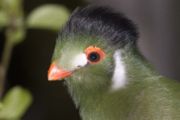
An example of a softbill
The following description has been taken, with
permission, from
Softbills.org-
The term softbill is not a scientific one and has been used,
and more often misused, in aviculture for numerous years. It
is a very misleading title, as many species that fall into
the category do not have a soft bill at all; anyone who has
ever been attacked by a hornbill can attest to this.
The proper use of the term is in reference to the ‘soft
food’ diets which basically fall into the following six
categories:
- Carnivorous – those who feed on small mammals, birds
or other vertebrates (eg. Kingfishers, Rollers)
- Insectivorous – those who feed on insects and other
invertebrates (eg. Bee-eaters, Fly-catchers)
- Omnivorous – those who feed on both animal and plant
material (eg. Corvids, Hornbills)
- Frugivorous – those who feed on fruit (eg. Turacos,
Fruit Doves)
- Nectarivorous – those who feed on flower nectar (eg.
Hummingbirds, Sunbirds)
- Folivorous – those who feed on leafs, petals and
other plant material (Turacos, Mousebirds)
This sixth diet type is usually in association with one
of the above, as very few birds are solely foliverous, a few
species of Galliforme come to mind, however they are not
considered to be Softbills.
A more recent definition by Clive Roots is, “Cage and
aviary birds with relatively soft bills, which feed upon
insects* and soft plant material and whose young are
helpless at birth”.
- including other larger animal prey
This latter definition does discriminate against a few
species, however as can be seen, the definition is very
subjective and can encompass numerous species not generally
included in the group.
References-
- The New Softbill Handbook Werner & Steinigeweg
- The Bird Keepers Guide to Softbills David Alderton
- Softbills: their care, breeding & conservation
Martin Vince
- Encyclopedia of Softbilled birds Dr. Matthew Vriends
- Softbilled Birds Clive Roots
- The Encyclopedia of Aviculture IN PRESS
-
Softbills.org




